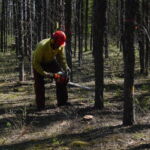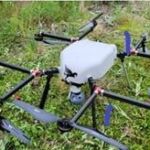
Last year, FPInnovations specialists were asked to develop and budget cost-efficient road reinforcement options with geosynthetics for the Jade Road. This project aimed to upgrade the road for today’s heavy haul trucks by adding a thick layer of pitrun aggregate on top of the old road surface. FPInnovations road researchers Francis Bober (formerly with FPInnovations), Papa-Masseck Thiam, and Allan Bradley were also asked to monitor construction activities to ensure that the geotextiles were installed using best practices and per the road designs. Meek Forestry Service performed the upgrade and Barrens Northern Transportation loaded and hauled the locally sourced pitrun gravel.
Description of work
The start of the Jade Road passes through a weak clay deposit that loses much of its strength when saturated and drains very slowly (i.e., it can stay weak for a long time). FPInnovations selected geosynthetics for the project that would be both economic and effective at reinforcing the weak clay subgrade. The design objectives were:
- To create a bulletproof road that would survive very weak wet soil conditions and heavy truck traffic; and
- To develop a road comparable in strength to a deep gravel layer (the current approach to wet sections).
Four road designs were trialed on the Jade Road:
- The first trial section, which was 450 m long, was a conventional solution featuring about 400 mm of pitrun material that was spread, shaped, and then wheel packed by the gravel truck traffic. Apart from requiring a lot of gravel this road design has been known to fail under very weak subgrade conditions. Modeling showed that the gravel layer would need to be 625 mm thick to provide a “bulletproof” road that never fails under wet road conditions.
- The second trial section was 410 m long and was an improved version of the 400 mm-thick section. FPInnovations improved the deep gravel design by underlaying it with non-woven geotextile to act as a separator layer and having a vibrating drum roller compact the gravel in lifts.
- The third trial section was 1080 m long and featured a gravel layer 225 mm thick, reinforced with moderate strength woven geotextile, and compacted in lifts. This section was comparable in strength to the first, deep gravel, section but required 44% less aggregate.
- The fourth section was 360 m long and was intended to provide a “bulletproof” solution and it had 350mm of gravel, reinforced with moderate strength woven geotextile, and compacted in lifts.

| 1. Deep (400 mm) gravel |
2. Compacted deep (400mm) gravel with non-woven geotextile |
3. Compacted gravel (225mm) with med. woven geotextile |
4. Compacted gravel (350mm) with med. woven geotextile |
|
| Estimated cost per km | $37,700 | $58,200 | $49,900 | $63,000 |
While on site, Allan Bradley and Francis Bober worked with HTTV of Kenora, ON to prepare a video showing the project highlights:
2023 project follow-up
The trial sections were put to the test during the spring of 2023. This summer, FPInnovations researchers will return to the Jade Road to learn about the performance of the trial sections during hauling, gather details about construction and maintenance costs, and make a determination about whether the geotextile-reinforced sections were an effective and economic alternative to a deep gravel layer.
For more information about the project, please contact Allan Bradley at allan.bradley@fpinnovations.ca





